
Many people believe that talk therapy is the best treatment for their anxiety disorder. Therapy involves talking with a trained mental health professional, such as a psychologist, social worker, or counselor. The goal of therapy is to help patients learn how to better manage their anxiety and to reduce the symptoms of panic attacks and other disorders. Behavioral therapy is also effective for treating specific problems, like panic attacks. It may be necessary to undergo counseling, particularly if you have experienced a traumatic or disturbing event.
Depending on the specific symptoms that a person experiences, physical conditions may contribute to anxiety. Stressful or traumatic events may trigger a panic attack, or even a nervous breakdown. Although anxiety disorders are not curable, they do require therapy and treatment. To identify the underlying causes of your symptoms, you should speak with a trusted adult. A doctor can also run tests and conduct an interview to determine whether your symptoms are actually related to another medical condition.
Anxiety medicines are prescribed for six to twelve months. Your healthcare provider can determine whether you need to take the medication for an extended period of time or stop it altogether. If you are taking therapy to address the underlying cause of your anxiety, you may not need to take the medicine for a long period of time. If you stop taking your medication for a long period of times, it’s important to check with your healthcare provider to make sure that it is not causing any problems.
Anxiety can be triggered by traumatic or stressful events, or it can be due to a genetic predisposition to anxiety. In addition, it can be caused by a person’s life experiences. If they are prone to being anxious, they can experience stressful or traumatic events in their lives. Anxiety is also a result of genetics. There are a number of underlying causes of anxiety, and the symptoms can be hard to pinpoint.
Genetics is a possible cause of anxiety disorders. Your genes play a role in how your brain regulates neurotransmitters. While you may have some genes for an anxiety disorder, the fact is that the disorder is not necessarily genetic. Anxiety is a common reaction to stressful life events, such as a job interview or a big move. But even though some of these events are traumatic, they may not cause disease.
Anxiety is genetic, but there are many other factors that contribute to anxiety symptoms in children. First, parents’ anxiety can be passed on to their children. Maybe even a child’s anxiety can be caused by an alcoholic or drug addict. For these reasons, it is important to understand what is causing your anxiety and provide appropriate treatment. Once you have established what is causing your symptoms, you can begin to treat them. For more information on treating anxiety, see the website https://palermo-store.it/.
Despite the fact that anxiety disorders are often caused by physical causes, everyone experiences some level of anxiety at some point in their lives. The condition is a normal response to physical and psychological stress and prepares the body to respond appropriately. In contrast, an anxious person might feel a lot of fear when he or she faces a danger, but the fear is often temporary and can last for a longer period of time. Eventually, this can lead to severe panic attacks, which are even worse than their actual causes.
The underlying cause of an anxiety disorder can be a variety of factors. For example, the anxiety disorder could be a physical condition, such as a physical injury or a family history of anxiety. Regardless of the cause, the symptoms of an anxiety disorder should be addressed as soon as possible. There are a variety of different types of therapies available to treat a person’s anxiety, but the main reason for treatment should be the right one for the individual.
Despite the fact that these underlying causes of anxiety are not entirely known, there is a clear link between an anxiety disorder and a thyroid gland overactive in the thyroid. There is no definitive proof that a particular condition caused an anxiety disorder, but there are other factors that can contribute to anxiety. A compulsion is an unwelcome thought, image, or behavior that causes the person to feel anxious. This is another cause of an excessive amount of anxiety.